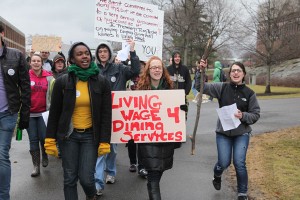The other day, my roommates and I were discussing student debt when one of them revealed that she owes more than $50,000 in student loans. “What?” we all shrieked in disbelief. She has borrowed thousands in loans just to follow her passion of creating films. We’ve known her since freshman year, and we often saw her leave for work, but we never knew her story.

As students, many of us face student debt and other financial burdens. Some of us even work in smelly dish rooms in dining halls or travel 20 minutes to work a minimum wage job for corporations on Route 13. We overload our schedules and cram as many course credits as possible into one semester in order to graduate early. We transfer to cheaper colleges, or we drop out of school.
These narratives need to be shared. Often, we think of our problems as only personal and fail to grasp how these are not individual problems at all. The Occupy Wall Street movement grew as small groups of people that gathered to share their anger about corporate greed and to convey their stories in order to form a community. The time is now for students to gather with their shared frustrations concerning student debt, tell their stories and build a community around this common struggle.
When we deal with our burdens alone — which we often do — we establish them as personal and, in turn, depoliticize our struggles. It is time to make personal problems political ones. We often think of increasing student debt, the financial crisis or corporate greed in terms of abstractions — societal structures that are confusing, immense and impossible to change. We forget that student debt is the amount of money students owe to loan agencies, that the financial crisis is your friend’s house getting foreclosed and that corporate greed is the meager wages your roommate receives from his employer.
If we express our anger to others instead of internalizing it, we can help show those around us that they are not in this struggle alone. When we see that student debt is not only how much debt you are in, but also how much debt everyone who surrounds you is in, it becomes less of an abstraction and more of a reality we all share.

It is not always easy for us to share our stories. Our society is intricately structured around individualism instead of community, so sharing stories seems too unnatural and vulnerable a move. We demand that no one shall feel any sympathy for us, and that we can overcome anything on our own. We also must begin to see the isolation that lies ahead if we insist on going through life’s problems alone. This stunts our personal growth and hinders us from ever really making social change. We need not only to stand united, but also to feel and be united.
Students who want to begin this conversation should come to the Labor Initiative in Promoting Solidarity’s Occupy the Mic event at 7 p.m. Tuesday in IC Square. Students can share stories concerning their personal economic troubles and listen to others’ stories. As we better understand the problems we all face, we can begin to create a true sense of solidarity among students. To further discuss what we can all do about our collective struggle, students can come to LIPS’s general meetings, which are held at 7 p.m. Tuesdays in Williams 218.







